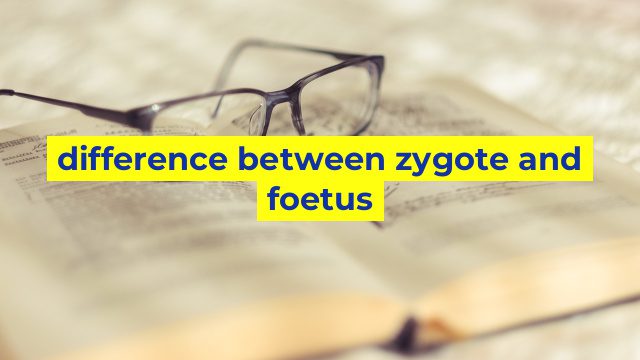Understanding the Biological Difference between Zygote and Foetus
If you are interested in the human reproductive system, you have probably heard of the terms zygote and foetus. While both are related to the process of human conception and pregnancy, they are two different stages in the development of an individual. In this article, we will help you understand the biological difference between zygote and foetus.
Zygote
The zygote is the first stage of development after fertilization. When the sperm cell from the father fertilizes the egg cell from the mother, they fuse together, creating a single cell called the zygote. The zygote contains all the genetic material from both the mother and father, and this marks the beginning of a new individual’s life.
The zygote undergoes a series of cell divisions, which eventually form a cluster of cells known as the blastocyst. The blastocyst consists of two parts; the inner cell mass (ICM) and the outer layer of cells, also known as the trophoblast. The ICM is responsible for forming the embryo and the foetus, while the trophoblast is essential in the formation of the placenta.
Foetus
The foetus stage comes later in the process of human development. It starts around the ninth or tenth week of pregnancy, and it marks the beginning of a fully-formed human being. Before this stage, the cells are still dividing and differentiating, working to form the various parts of the body.
During the foetal stage, the different body systems, such as the respiratory, digestive, and nervous systems, continue to develop and mature. The foetus also grows rapidly in size, with recognizable human features such as eyes, ears, and limbs becoming evident.
Conclusion
In summary, the zygote is the single cell that forms after fertilization, while the foetus is the stage where the embryo has developed into a fully-formed human being. Understanding the difference between these two stages is crucial in understanding the biological process of human conception and pregnancy. As such, it is essential to keep yourself informed and educated on the subject to make more informed decisions in terms of reproductive health.
Table difference between zygote and foetus
| Feature | Zygote | Foetus |
|---|---|---|
| Definition | The initial developmental stage after fusion of a sperm and an egg | The later developmental stage after the zygote has implanted in the uterine wall |
| Size | Smaller than 0.1mm | Approximately 30 cm in length by the end of the 9th month |
| Number of cells | Only one cell | Trillions of cells |
| Organ development | No organs have formed yet | All major organs have formed |
| Duration | From fertilization to implantation (about one week) | From implantation to birth (about 9 months) |
| Viability outside the womb | Not viable | May be viable (with medical assistance) after 24 weeks |

